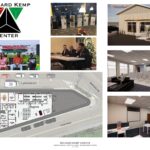Cultural Empowerment Center
Vermont Racial Justice Alliance CULTURAL EMPOWERMENT AND ECONOMIC ADVANCEMENT FUND
August 24, 2021
CULTURAL EMPOWERMENT AND ECONOMIC ADVANCEMENT FUND
The Vermont Racial Justice Alliance (VRJA) requests financial contributions from businesses, organizations, the city of Burlington and state agencies to assist in the creation of a Cultural Empowerment and Economic Advancement Fund. VRJA invites collaboration in this work to ensure program implementation through a Cultural Empowerment and Economic Advancement initiative in Burlington, Vermont, known as the Cultural Empowerment Center (to be formally named through community involvement).
Our Black communities are at the core of our values because this is where we live and interact. We will partner with Black-led business and community in the implementation of a Cultural Empowerment Center. Located central to those it serves, this facility will serve as a bastion of hope, purpose and vision for the Black community. The facility will contain a Community Center, Youth Activities Center, State of the art classrooms, Art and Science Centers of Excellence. The Center will be centered on our Black community with a focus on economic development and supported through a community partnership.
Programming offered from this facility will include and will not be limited to Adult Basic Education, Basic Computer Skills Training, People Development, STEM Development, Entrepreneurial Cultivation Programs and Technical Assistance Grant Fund.
Purpose
The purpose of this initiative is to invest in systems of economic advancement and cultural empowerment as a way to move towards greater racial and social equity in wealth distribution, health, resilience, and economic and cultural prosperity.
Principle
Vermont embraces its responsibility to course correct the historical impact of economic exploitation and exclusion from opportunity due to race and ethnicity for American descendants of slavery and the broader Black, Indigenous, and other Persons of Color community.
Background
- History, research, and experience demonstrate that Vermont residents experience barriers to the equal enjoyment and benefit of economic opportunity and cultural empowerment based on race and ethnicity.
- The United States was founded as a country on a triangular relationship between settlers, native persons, and slaves. This structure created an inequity for wealth, economic resources, cultural empowerment, homeownership, and land access through systemic oppression and systematic racism for those who were defined as native or slave.
- Housing disparity and land access may increase with COVID-19, advancing the triple threats of oppression—racism, classism, and sexism—in the State.
- Without adequate access to land and home ownership, Black folks and other people of color are forced to live in multigenerational housing, placing them at higher risk to COVID-19 exposure.
- Property ownership rates for the Black and other people of color in the State continue to remain stagnant.
- In a 2019 equity report, Burlington city officials found that Black and other people of color own only four percent of the homes, though they make up 18 percent of the city’s population.
- Black Burlingtonians are four times as likely to be denied for a home loan as a White counterpart. This is a direct result of the wealth gap between them and their White counterparts.
- The median household income for a Black Vermonter is $41,533.00 compared to $58,244.00 for their White counterparts.
Programming
- Provide cultural empowerment programming to:
- educate on the true history, contributions, and resilience of American Descendants of Slavery (ADOS) and other Black, Indigenous, and other Persons of Color;
- serve as a resource, facilitate, and assist in the implementation of ADOS cultural commemorations and celebrations;
- facilitate various additional cultural activities; and,
- serve as a central hub for access, cultivation, creation, and curation of cultural arts.
- Establish a Business Cultivation and Support Program, including:
- small business technical assistance;
- small business grants and loans;
- small business-to-business mentorship program; and,
- small business procurement contract assistance.
- Coordinate personal and professional development, including:
- adult basic education;
- basic computer skills
- career development; and,
- personal and career coaching.
- Deliver wealth development and management planning, consisting of:
- financial management;
- home and land ownership; and,
- investment management.
- Community Engagement and Support
- events and activities;
- youth arts and science and athletics; and.
- spiritual, emotional and financial support.
Estimated Costs
Initial costs are estimated to be approximately 400K for initial up-fitting and an additional 150K to 200K for office and classroom furnishings and equipment. Operating costs are estimated to be approximately 415K for the first year, expanding to 1.5M in the fifth year of operations.

 Next Post
Next Post